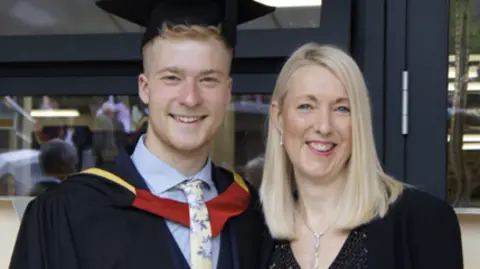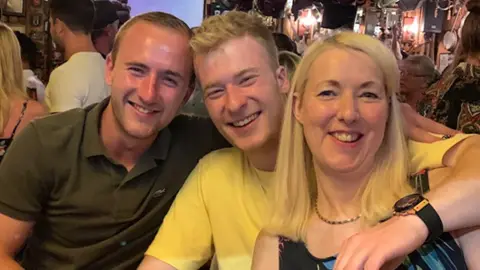'Mum still had an awful lot of love to give'
 Harry Marshall
Harry MarshallA man who lost his mother to a heart attack aged 54 has called for improvements in prevention and treatment of heart disease after a charity said deaths had hit a 14-year high.
Harry Marshall, originally from Haworth, lost his mother Alison to heart failure in 2021.
He said she was "definitely taken too early".
He has backed the British Heart Foundation's (BHF) call for urgent action to reverse what it described as a "lost decade" of progress in tackling heart disease.
Mr Marshall, 26, said his mother had been diagnosed with heart failure in 2018, the year before his brother, Tom, took his own life.
"When we lost Tom in October 2019 it was a terrible shock as we didn’t realise anything was wrong," he said.
Mr Marshall, who currently lives in Canada, was living in Australia at the time and flew back for his brother's funeral.
He said: "When I got home I found out that my mum had had a heart attack when she found out the news about my brother.
"Ever since then... she never got back fully fit."
 Harry Marshall
Harry MarshallMr Marshall's mother died in July 2021 while he was back in Australia and he was only able to say goodbye to her on the phone.
“She was definitely taken too early, she still had an awful lot of love to give especially to all her grandchildren.
"There is just so much that she’s missed out on - she never even got to see any of her children marry and whenever there’s a big family event or occasion it makes me really sad to think she’s not there to celebrate it with us."
He said he would "welcome anything that can be done to make sure other families don’t have to go through the same heartbreak we have".
'Lost decade'
According to the BHF the number of under-75s dying from heart and circulatory diseases in England rose to more than 39,000 in 2022, the highest level since 2008.
The rate of premature deaths had been falling, in part thanks to decades of medical breakthroughs.
But it had now increased for three years in a row, the first clear reversal in the trend for almost 60 years, the charity said.
It said reasons for this could be stubbornly high obesity rates, pressure on the NHS, the Covid-19 pandemic and what it described as a lack of meaningful action from government to address the causes of heart disease and stroke.
The BHF called for improved prevention work, the prioritisation of NHS heart care and more research to unlock new treatments and cures.
Dr Charmaine Griffiths, its chief executive, said: "For more than half a century, pioneering research and medical advances helped us make huge strides towards reducing heart attack and stroke deaths.
"But this has been followed by a lost decade of progress in which far too many people have lost loved ones to cardiovascular disease too soon."
A spokesperson for the Department of Health and Social Care said: "This government has already taken significant action to reduce cardiovascular disease and its causes, including increasing access to testing and successfully encouraging reduced salt and sugar intake, but we know there is more to do."
Follow BBC Yorkshire on Facebook, X (formerly Twitter) and Instagram. Send your story ideas to [email protected].
